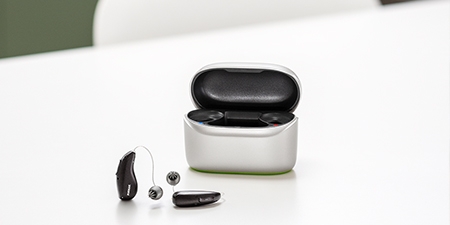Over-the-Counter (OTC) vs Prescription Hearing Aids

Over-the-Counter (OTC) vs Prescription Hearing Aids
10 min
Published December 17, 2024
OTC vs Prescription Hearing Aids
As technology advances and wireless electronics for communication continue to become a part of our everyday lives more and more, it's no surprise you can walk into your local pharmacy and purchase an over-the-counter (OTC) hearing aid without even having a hearing aid exam. But how does this option compare to a prescription hearing aid from an audiologist? Understanding suitable uses for OTC devices and their limitations will help manage expectations for anyone looking for a quick solution to hearing loss.
The FDA's Approval of OTC Hearing Aids
In 2022, the FDA announced a significant ruling that allows the sale of OTC hearing aids for individuals with perceived mild-to-moderate hearing impairment. This approval opens doors for many, making hearing aids easily accessible. Consumers can now find these devices in their local pharmacies or online without a prescription from an ear doctor. However, it's essential to understand the nuances and limitations of OTC hearing aids to make an informed decision.
Convenience of OTC Hearing Aids
OTC hearing aids are designed for ease and simplicity. They're readily available for purchase without professional consultations, making them an attractive option for those who want a quick and straightforward solution. If you have mild hearing loss - experiencing trouble hearing soft sounds like a refrigerator running or someone whispering - OTC hearing aids might be a viable choice.
Who Benefits from OTC Hearing Aids?
Simplicity Seekers - Those looking for a hassle-free, over-the-counter solution to address mild-to-moderate hearing loss who might only use the device occasionally.
Cost-Conscious Consumers - Someone on a strict budget who doesn't believe their hearing loss is too significant to invest.
Tech-Savvy Users - People comfortable with self-adjustment and limited support services.
Limitations of OTC Hearing Aids
While OTC hearing aids offer several conveniences, they have their limitations:
Limited Customization - These devices are generally one-size-fits-most, offering minimal customization tailored to individual hearing profiles.
Basic Technology - The level of technology and features in OTC aids are less advanced than those in prescription hearing aids.
Limited Treatment - OTC devices only help with perceived mild to moderate hearing loss, meaning they won't keep up as age-related loss progresses.
Self-Management - Users may need to handle adjustments and troubleshooting on their own, without professional support from a hearing clinic.
Why Prescription Hearing Aids May Be the Better Choice
Prescription hearing aids, on the other hand, offer a highly personalized experience. They're custom-fitted to your specific hearing loss and ear shape based on your hearing test results, providing a more tailored solution. Here's how they surpass OTC products:
Custom Fittings
Prescription hearing aids are precisely fitted to your ear, ensuring maximum comfort and effectiveness. An audiologist or hearing aid specialist will perform a detailed ear assessment and adjust the device to match your unique needs.
Advanced Programming
These aids are programmed based on the results of your comprehensive hearing test. This means your hearing aid will be finely tuned to address the specific frequencies where you experience hearing loss, offering a more effective solution.
Ongoing Support
One significant advantage of prescription hearing aids is the ongoing support you'll receive from hearing care professionals. Your team provides continuous support for hearing aid maintenance, adjustments, and troubleshooting, ensuring your devices work optimally at all times.
The Numerous Benefits of Prescription Hearing Aids at AudioNova
Expert Consultation - A thorough hearing evaluation by a certified hearing care professional.
Advanced Features - Adaptive technology that adjusts to different listening environments.
Enhanced Comfort - Tailored fittings for long-term wear without discomfort.
Professional Support - Access expert advice and hearing aid repair whenever needed.
Higher Quality - Products manufactured with superior materials and craftsmanship.
Learn More About Our Prescription Hearing Aids
Choosing between OTC and prescription hearing aids depends on your needs and preferences. If you're looking for a quick, affordable solution and have perceived mild-to-moderate hearing loss, OTC hearing aids might work. However, most adults with age-related or noise-induced hearing loss find that OTC devices won't keep up as their condition worsens. For those seeking a more customized, high-tech, and supported experience that will evolve as their hearing changes, prescription hearing aids are the better option. Contact one of our locations near you to learn more about the different types of hearing aids available at AudioNova.




